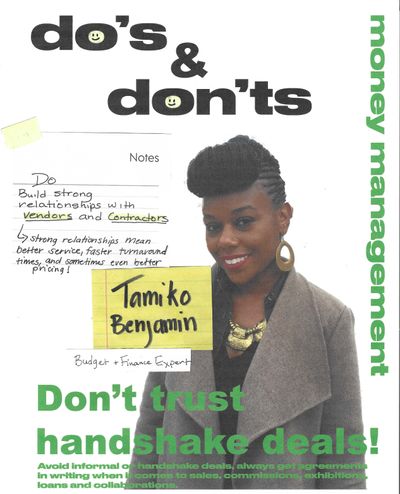Do's and Don'ts: Tamiko Benjamin
Artist business manager Tamiko Benjamin shares ten financial tips for artists culled from 13+ years of experience
By Rayna HolmesA native New Yorker, Tamiko Benjamin is the business manager to a world-renowned painter, movie director, and designer. While managing the studio team, she is the go-to person for all things related to operations including but not limited to needs around accounting and procurement. Alongside her 13 years as a business manager, Benjamin is also the founder of The Perfectly Balanced Life Inc, a lifestyle improvement company that works with individuals and corporations to promote self awareness and personal responsibility. Regardless of creative medium, every artist needs someone like Benjamin in their life for guidance on how to navigate the money side of things.
Do's and Don'ts is an ongoing series for Metalabel Studio where we ask interesting creative people to share their learnings about the artistic ecosystem. No fluff, just practical insights from those who've been in the trenches.
From the mind of Tamiko Benjamin: the do's and don'ts of artist money management
Do:
1. Build Strong Relationships with Vendors and Contractors
Your network of framers, printers, shippers, and suppliers can make or break your ability to meet deadlines and execute your vision.
Strong relationships mean better service, faster turnaround times, and sometimes even better pricing.
A trusted network can help make the impossible possible when challenges arise.
2. Have a Financial Team
Surround yourself with a CPA, a banker, and a financial advisor who understand the art world.
A knowledgeable financial team ensures smooth transactions, helps avoid tax pitfalls, and keeps your business legally sound.
Many artists struggle with cash flow, tax surprises, and financial planning—having the right experts helps you avoid these common pitfalls.
3. Know Your Business
Many creatives get lost in the process of making art and lose sight of the business side—but knowing your numbers is essential.
Even if it's not the fun part, you must understand pricing, expenses, contracts, and revenue streams to sustain a long-term career.
Treat your art practice like a business—because it is one.
4. Diversify Your Income Streams
Relying on a single revenue stream (like just selling paintings) can be risky—having multiple income sources creates stability.
Explore different price points and opportunities, such as prints, commissions, licensing, teaching, or collaborations.
A few irons in the fire keep you prepared for market shifts and slow seasons.
5. Network and Build Your Ecosystem
Your connections are as valuable as your talent—building relationships opens doors to opportunities, collaborations, and financial success.
Surround yourself with peers, mentors, collectors, and industry professionals who support your growth.
A strong network provides not only opportunities but also resilience—you don’t have to navigate the business of art alone.
Tamiko Benjamin's dos and don'ts of artist money managemenr
Don’t:
1. Don’t Trust Handshake Deals
Avoid informal or handshake deals — always get agreements in writing when it comes to sales, commissions, exhibitions, loans and collaborations.
Contracts protect both sides and clarify expectations, payments, rights, and responsibilities.
Without proper agreements, artists risk non-payment, ownership disputes, and legal issues that can be hard to resolve. I believe in papering everything.
2. Don’t Mix Personal and Business Finances
Keep your art business finances separate from personal accounts to stay organized and compliant.
Open a dedicated business bank account and credit card to track income, expenses, and taxes properly.
Mixing finances leads to confusion and makes it difficult to measure the success of your business or prepare for tax season.
3. Don’t Underprice Yourself or Work Only for Exposure
Know and honor your worth! Underpricing not only devalues your work but also makes it harder to raise prices later.
Exposure doesn’t pay bills ensure every opportunity provides fair compensation or tangible benefits.
Set fair prices based on materials, time, skill, and market value, and stick to them to build a sustainable practice.
4. Don’t Take Shortcuts
You will encounter many “experts” who will have a go around for things. Trust the process and do your due diligence.
Your artist integrity will be your calling card, don’t compromise on your vision for quick results or fame it will come back to haunt you down the line.
5. Don’t Give Up!
- Like most businesses the art world has its ups and downs, you have to be willing to ride the wave. The art market is always evolving, what you’re doing may not be working at the moment but being able to pivot can make a world of difference.
- “Comparison is the thief of joy” and creativity I believe. Don’t be afraid to break away from the pack and the trends to chart your own way. Sometimes what seems like failure is merely an opportunity to reevaluate and reinvent.

